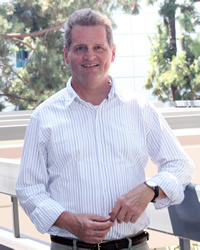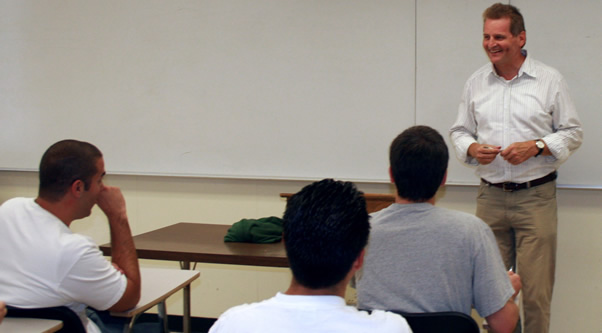Faculty Exchange
German Professor Teaches CSUF Students About American Culture
August 5, 2008
By Mimi Ko Cruz
Horst Tonn was born in the 1950s. He grew up wearing blue jeans, listening to rock 'n' roll and watching John Wayne, Marlon Brando and Ann-Margaret on the silver screen. He spent one summer helping organize grape and lettuce boycotts with the United Farm Workers, and he was a student at the University of Texas.

Horst Tonn
Tonn, a German university professor, has been fascinated by American life for as long as he can remember. He earned his master's and doctoral degrees in American studies from the Free University of Berlin and teaches the subject at the University of Tübingen. He also serves as chair of that university's American studies department.
He spent this summer at Cal State Fullerton, teaching an American studies course: "Documentary Expression in Post-War America.” His class examined documentary writing and film that reflect significant cultural moments in America from the end of World War II to the present, touching on the anxieties triggered by the atomic age and the Cold War to the Vietnam War, the counterculture and protest movements of the 1960s and war reporting from Iraq.
"Diversity of American culture is something that needs to be considered in our future because American society is so diverse and needs to offer a variety of viewpoints,” Tonn said.
Student Benefits
His students said Tonn offered an "exciting" different perspective of the development of American culture in the past 50 years.
"Professor Tonn is very knowledgeable about American culture and he offered great insight from his German experience,” said Robin Cruz, an American studies major, one of Tonn's 12 students.
Establishing Ties
Tonn's visit was part of a faculty exchange that was established last summer, when Jesse Battan, chair of CSUF's American studies department, taught a class at the University of Tübingen. A student exchange between the California State University system and Tübingen was already in place and many students from other CSU campauses have participated.
Faculty Benefits
"Faculty get a great deal out of the experience of teaching in a foreign country," Battan said. "It forces you to rethink the material you present to an audience that does not have the same background as the students at your home university. It makes you think more critically of things that you've taken for granted in the subjects you study and the materials you examine and discuss. You discover that things that seemed obvious or commonplace require a second look. A new context makes you see things in a fresh way."
Tonn agreed.
"Cal State Fullerton's American studies department is a fun, lively place with many energetic colleagues who pursue fascinating research," he said. "I learn from them and can perhaps contribute a thought or two. Faculty exchange is a good remedy against habitualized thinking and provincial outlooks. In spite of instant global communication through the Internet and e-mail, there is nothing that can replace intensive debate among scholars and the presence of a 'stranger' in the classroom. My students in Tübingen respond to guest professors very intensely and my students here seem to respond in a similar manner. In the best of worlds, this will encourage students to pursue exchange opportunities. One of my students was telling me today that she has signed up for an intensive German course for next semester."
Teaching Abroad
When Battan was at the German University, he taught a course on American cultural radicalism. His students examined the development of a specific style of rebellion that, from the 17th century to the present, has struggled with a wide spectrum of power relationships and forms of domination, Battan said.
"Moreover, in order to understand the relevance of this form of radicalism to the study of the cultural history of modern America, we examined such topics as: the social and economic context of its various manifestations; the politics of the cultural radicals; the emergence of literary and artistic modernism; generational conflict and the development of a distinctive youth culture; the interaction between Bohemians and the bourgeoisie; similarities and differences between the efforts and experiences of cultural radicals in America and those of their counterparts in Western Europe; and the impact of cultural radicalism on American life and thought," he noted.
Battan said two Tübingen students have studied at CSUF and another is set to attend classes this academic year.


